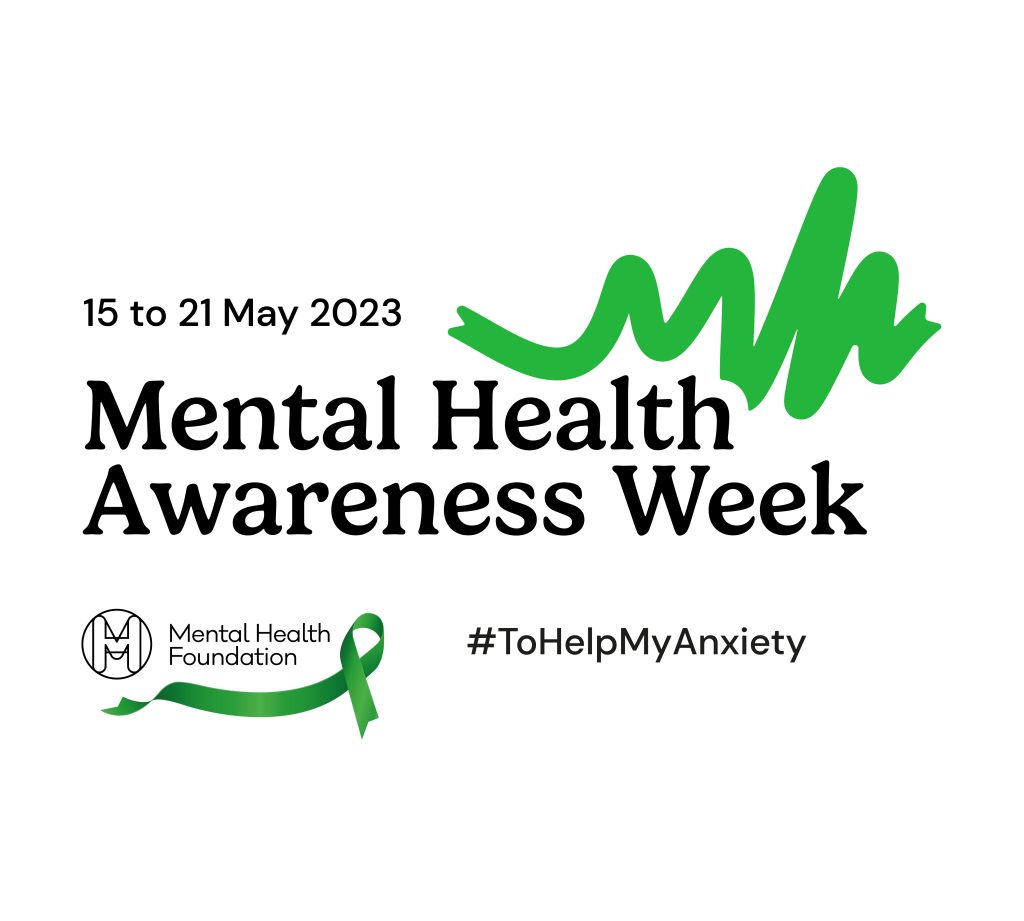Mental Health Awareness Week – 15th – 21st May 2023

Mental Health Awareness Week this year takes place from 15th to 21st May 2023. The theme this year is anxiety.
Anxiety is a normal emotion but sometimes it can take on a life of its own and become a mental health issue. Anxiety is one of the most common mental health problems we can face. In a recent mental health survey six in ten adults said that at least some of the time they felt so anxious that it stopped them from doing the things they wanted to do. Lots of things can lead to feelings of anxiety, including relationships, starting a new job or school, moving house or other big life events.
The Mental Health Foundation hopes that by focusing on anxiety for this year’s Mental Health Awareness Week, people will understand more about anxiety and the things that can help prevent it from becoming a problem.
The Foundation has provided information on techniques to reduce the impact of anxiety:
- Concentrate on our breathing – Close your mouth and quietly breath in through your nose, counting to four in your head. Hold your breath and count to seven. Breathe out through your mouth, making a whoosh sound while counting to eight. Repeat three more times for a total of four breath cycles.
- Exercise – It doesn’t have to be vigorous – try some gentle stretches, yoga, or go for a walk. Running, swimming, or taking part in a fitness class can give you something else to think about. It needs a bit of concentration, so takes your mind away from the anxious thoughts.
- Keep a diary – It’s important that we don’t try to ignore our worries. Taking the time to jot down what’s happening in your life and how it’s affecting you, can help you understand what is triggering your feelings of anxiety. Knowing this can help you better prepare for and manage situations that may cause anxiety. Sometimes it helps to give yourself a certain time of day to be your ‘worry time’, enabling you to move on from those feelings the rest of the time.
- Challenge your thoughts – Anxiety can make us think about the things that worry us over and over, preventing our brain from switching off from the worries. Take the time to stop and write down the worry – how realistic is it that it will happen. By challenging the worry, we can diminish it.
- Spend time in nature – Studies have shown that spending time in nature can make us feel calmer and more relaxed.
- Talk about how you feel – Sometimes saying your worries out loud, can help you deal with them.
- Get some quality rest and sleep – Having a good night’s sleep is hard when your head is full of worries but there are some things that can help. If anxious thoughts keep you awake, write them down in your diary. If sleep is still not coming, get up and have a drink (nothing with caffeine!) and wait until you’re feeling more tired before going back to bed.
- Eat a health diet – For many of us, feeling anxious might cause us to reach for sugary snacks, junk food or alcohol – none of which will help our anxiety.
Of course anxiety does not just affect adults, it also affects children. We monitor the children at all times to spot when they may be feeling anxious and to try to help them communicate their worries. We use our Worry Monsters in the Nurseries, as a tool to encourage the children to talk about any worries and to ‘hand over’ their worries to the Worry Monsters. We practise mindfulness and breathing techniques to help the children remain calm and eliminate any stresses. We spend as much time as possible outdoors to encourage the children’s connection to nature and for exercise. Our in-house cooks provide healthy meals for the children so their blood sugar remains stable; and we ensure the younger children sleep in the Nurseries to ensure they are well-rested.
As part of our partnership with parents and carers, we always update them on any concerns we may have in terms of a child’s mental health.


